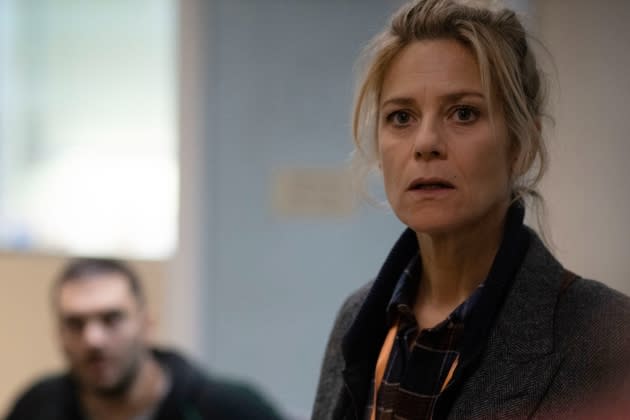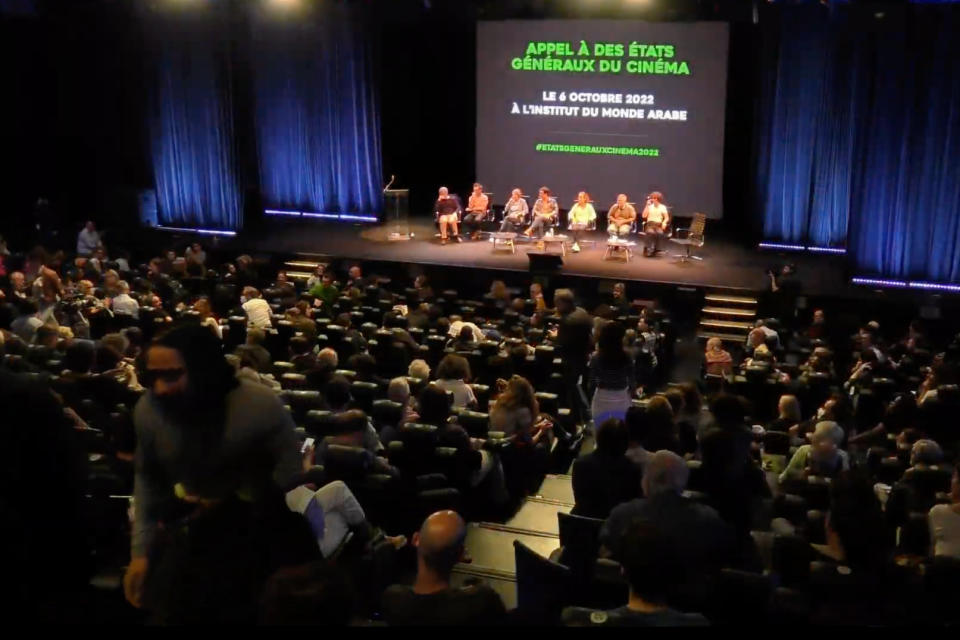French Indie Cinema Sector Calls For Revolution As Arthouse Box Office Slump Deepens
- Oops!Something went wrong.Please try again later.

French cinema professionals from across the country’s independent production, distribution and exhibition chain flocked to an emergency general convention in Paris this week to raise the alarm over the future of their industry.
France has long prided itself on being the most cinephile country on the planet, but there is a growing sense among its indie cinema sector that the population has fallen out of love with the seventh art in the wake of the Covid-19 pandemic.
More from Deadline
Figures released by the National Cinema Centre (CNC) last week revealed the worst September box office for the country in 42 years, with 7.38 million entries, for a rough box office of $47m, representing a 20.7% drop on September 2021, and a 34.3% fall on the same month in 2019.
Admissions for the first nine months of 2022 are currently trailing 30% below the average for the same period from 2017-2019. September’s drop was due in part to a lack of big U.S. titles on release but beyond that, the arthouse sector of the market has been ailing for months in the wake of the pandemic.
Other indie concerns include the relentless rise of streaming platforms; how high-end drama is encroaching on its audience; negotiations over France’s strict chronology laws that protect the theatrical window; the recent abolition of the TV license and what that means for film finance, as well as the perception that cinema-going is costly amid the cost-of-living-crisis.
There is also criticism of the policies of the CNC under the directorship of Dominique Boutonnat. His drive to support more commercial cinema, as well as high-end drama, and to internationalize the sector has raised hackles among the country’s cinema purists, while others see it as pragmatic in an age of convergence and globalized content.
There was no official attendance of the CNC or the Ministry of Culture at the General Convention at Paris’s Institut du Monde on Thursday (October 6), and this didn’t go unnoticed.
“Both the Minister of Culture and the CNC were invited today but they didn’t reply. If there is anyone in the room from either body, you’re, of course, welcome to speak,” said one of the moderators.
In the meantime, film professionals packed the main auditorium of the Institut du Monde Arabe – where they were guests of former Culture Minister Jack Lang who is now its director – with an overflow watching the debates on screens outside.
“We’re gathered here around a concern which has been troubling us for months. It’s time to sound the alarm in the name of love for the cinema,” said producer Judith Lou Levy, a member of the collective that drove the move to hold the meeting.
Elisabeth Perez at Chaz Productions added: “It doesn’t make sense to work so hard on our films if there’s no certainty they will be released in three, five years. That is where we’re at. There won’t be money, independent distributors, cinemas.”
Bannered the États Généraux du Cinéma, the convention had echoes of a 1968 gathering led by Claude Chabrol, Claude Lelouch, Jacques Rivette and Louis Malle.
But while France’s vibrant indie film sector has a long history of militancy, collective action and raising the alarm over its future, there’s a sense that the challenges at play are bigger than ever before.
“Over the summer, numerous articles were asking whether cinema is dead. We’ve been through crises before in which cinema ‘has died’ and cinema is still alive, as is evident in all of you who are here today,” said Etienne Ollagnier.
The seasoned distributor is co-head of indie label Jour2Fête, which has recent festival hits Godland and Under The Fig Trees on its current slate.
“But I think we are now at a crucial crossroads where we independent professionals – distributors, exhibitors, auteurs and producers – need to roll up our sleeves collectively and take our destiny in our hands… We’re in a time of emergency. We need to get spectators back into the cinema theatres, right now.”
Thursday’s meeting grew out of an open letter in the Le Monde newspaper during the Cannes Film Festival last May decrying the current government and the CNC’s track-record vis-à-vis cinema.
Penned by a collective of top cinema professionals including Benedetta producer Saïd Ben Saïd, director Catherine Corsini and actress Carole Bouquet, the missive sparked wider discussion and research into the challenges facing the sector over the summer, as well as a call for the general convention to discuss the situation.
Has French public fallen out of love with cinema?
Gautier Labrusse, director of the Lux Cinema in the northern French port town of Caen, was among those sharing his findings and reflections on Thursday.

He recounted how the audience had come back when cinemas were reopened over the summer of 2020, after the first lockdown, but that a second lockdown from October 2020 to May 2021 had had a longer-term impact on admissions and changed habits.
“The second lockdown was a lot more damaging,” he said. “We got the sense that our public, which, as has been noted here, is ageing, had equipped itself with screens, took up subscriptions with the platforms and started watching more series.”
Labrusse suggested the French film industry also had an image problem that had contributed to the public’s “falling out of love” with cinema.
“For me, this dates back in time, from the Polanski Affair right up to the fiasco of the Césars,” he said.
He was referring to the controversy around Roman Polanski being nominated in multiple categories in the national César film awards for An Officer And A Spy against a backdrop of fresh sexual assault allegations, and the meltdown of the César academy in 2021 amid a backlash about its lack of transparency which led the whole board to resign.
“Our biggest concern is how together we can re-enchant people with going to the cinema,” he said.
Séverine Rocaboy, who has run the Les Étoiles cinema in the suburbs of Paris for more than 30 years, also took to the stage.
“We’re being asked to innovate but if we look at the films that are working, there’s Top Gun, which is a reboot of a film that came out 35 years ago, and a week ago it was the Avatar [re-release], which drew the most spectators [in France]. We’re in a dangerous place.”
Rocaboy, who is a member of France’s national consortium of research cinemas, the GNCR, suggested the loss of theatres such as hers would have a wider knock-on effect for cinema worldwide.
“What is a ‘salle de recherche’ (research cinema)? It means going out and doing research. If there hadn’t been research in medicine, we’d still be treating people with bloodletting and enemas. You get my gist. It’s about trying things and taking risks,” she said.
“The GNCR celebrated its 30th anniversary and we created a geographical snapshot of the filmmakers we’ve supported. It included Abbas Kiarostami, Abderrahmane Sissako, Wong Kar Wai, Naomie Kawase and Chantal Akerman.
“We realized that if we had not done the work we did, taking the risks we did and doing everything we could so that these films connected with their public, Jane Campion wouldn’t have had the Cannes Palme d’Or, nor would have Bong Joon-Ho. The paradox is that all this takes time and we’re in an emergency situation,” she said.
Government attitude towards cinema, time to revolt
Producer Ben Saïd said the current French government’s attitude towards the cinema industry and tweaks to the CNC’s funding processes were also putting pressure on the sector.
“There’s a myth that French cinema and its professionals are subsidized by the CNC. The fact is, that all the CNC does is organize the circulation of the money, which comes from the exploitation of the films,” he said, referring to the 10.7% tax on every cinema ticket that is put back into the film industry.
“This is redistributed as automatic support, which is a sort of bonus for commercial films, and selective support, for films that have an artistic ambition but may not have the arms to face the market… French cinema has worked in this way for 75 years and it’s a system that is envied throughout the world.
“They’re trying to enter criteria into the selective support process such as rentability, performance and results which is going to completely destabilize our system. It seems to me that the priority should be to hold on to the singularity of the films and not to act as if all films resemble one another.”
Wrapping up the four-hour meeting, Arthur Harari, director of critically acclaimed Cannes 2021 Un Certain Regard title Onoda: 10,000 Nights In The Jungle, said the next step was to get the CNC to engage with the États Généraux process.
“The ball is now in the court of the CNC. That’s the organization we need to demand, listens to us, not Bercy [the Ministry of Finance] or the Ministry of Culture. It’s our home, our ship,” he said.
“If they refuse to receive us that is a conflictual situation. It’s our supervisory body that is refusing to listen to us. We’ll have to take things into our own hands. It’s a question of politics and democracy. If the notion of the Etats Généraux is not supervised by the organization as it should be, it will be time to revolt.”
Best of Deadline
James Bond Movies In Order: Filmography, Bond Women & Iconic Villains
The Royals And Politicians Of 'The Crown' And The Actors Who Play Them — Photo Gallery
Sign up for Deadline's Newsletter. For the latest news, follow us on Facebook, Twitter, and Instagram.

